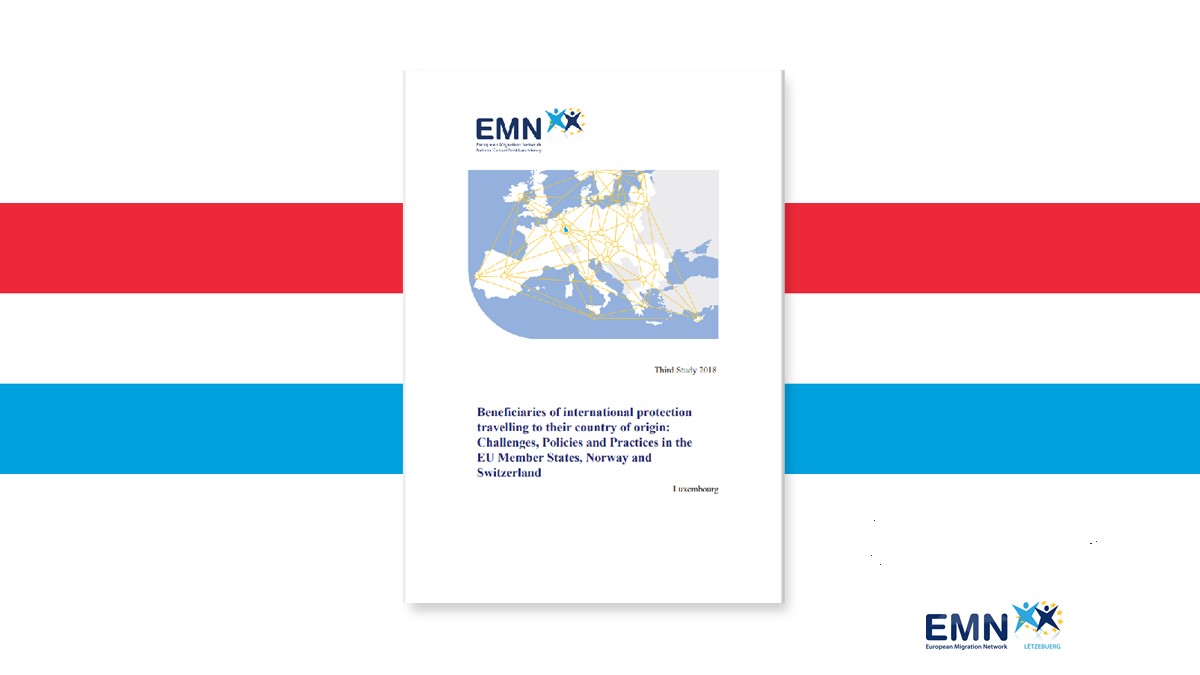The main objectives of this study of the European Migration Network are to provide objective and reliable information about beneficiaries of international protection who travel to their country of origin or come into contact with national authorities of their country of origin, and information on cases where international protection statuses were ceased leading to, for example, the status being ended, revoked or not renewed (as per Article 45 and 46 of the recast Asylum Procedures Directive) and, ultimately, the permission to stay withdrawn.
For the Luxembourgish case, it is firstly important to note that beneficiaries of the refugee status and of the status of subsidiary protection are not subject to the same restrictions with regard to travel to the country of origin or contact with national authorities. While refugees are in principle not permitted to travel to the country of origin, beneficiaries of subsidiary protection are not subject to this restriction.
In this context, the phenomenon of beneficiaries of the refugee status travelling to their country of origin is currently not considered a policy priority in Luxembourg. While it does occur, there are no statistics providing information on how many refugees undertake this journey or contact the national authorities, on the reasons for travel to the country of origin, nor is there any case law on the cessation of the refugee status for reasons of travel to the country of origin. Luxembourg’s authorities are not systematically informed of such events by the authorities of other Member States. Luxembourg has no external borders with the exception of the international airport of Luxembourg, from where only an extremely limited number of flights to third countries depart. Thus, it is extremely difficult to capture the extent of the phenomenon in Luxembourg.
Luxembourg’s Asylum Law establishes the re-availment of the protection of the country of origin and the voluntary re-establishment in the country of origin as grounds for cessation of the refugee status. Travel to the country of origin or contact with its national authorities are not explicitly forbidden by legislation.
In principle, refugees are not permitted to travel back to the country of origin. They are provided with this information on multiple occasions: for instance at the moment of the introduction of their application, as well as when they are issued the decision granting them protection. Their travel document also clearly states the restriction. There is no notification or authorisation procedure that would authorise such travel in Luxembourg.
When the Directorate of Immigration has the information that a refugee travelled back to the country of origin, it will proceed to an in-depth analysis of the personal situation of the individual. Determining that this travel is proof of the voluntary re-establishment in the country of origin is however considered extremely difficult, as it is nearly impossible to ascertain the reasons for which the refugee returned. Furthermore, a short stay in the country of origin is not necessarily considered like the (permanent) establishment in the country of origin or a proof thereof. This is also due to the fact that the Luxembourgish authorities cannot contact the authorities of the country of origin and have no tools to undertake an investigation there in order to verify that the refugee has re-established him/herself. The travel and the surrounding circumstances can be taken into account if the minister decides to re-examine the validity of the status, which could potentially lead to a withdrawal.
The Directorate of Immigration has never considered ceasing protection because a refugee contacted the authorities of the country of origin. Proving that this contact occurred in the first place, and next, proving that it constitutes a re-availment of the protection of the country of origin, is considered nearly impossible. In addition, it is a fact that certain administrative procedures require the production of official documents and that the substitution of these documents with affidavits are in practice not always feasible.
As previously mentioned, beneficiaries of subsidiary protection are authorised to travel back to their country of origin and are permitted to contact the authorities of their country of origin. They are even encouraged to contact the national authorities in order to obtain a national passport. These actions can thus not lead to the cessation of the status of subsidiary protection.
If the decision to cease the status is taken, the beneficiary is notified of this decision in writing. The decision can be appealed before the First instance Administrative Court. If the decision of the Court is negative, the individual can file an appeal before the Second instance Administrative Court. In principle, the decision to cease international protection carries a return decision. However, the individual can apply for another residence permit if s/he fulfils the conditions established in the Immigration Law. The same is true for family members who got a residence permit through family reunification with the concerned person: the family members will lose their right to stay unless they can gain access to another residence permit under the Immigration Law.

